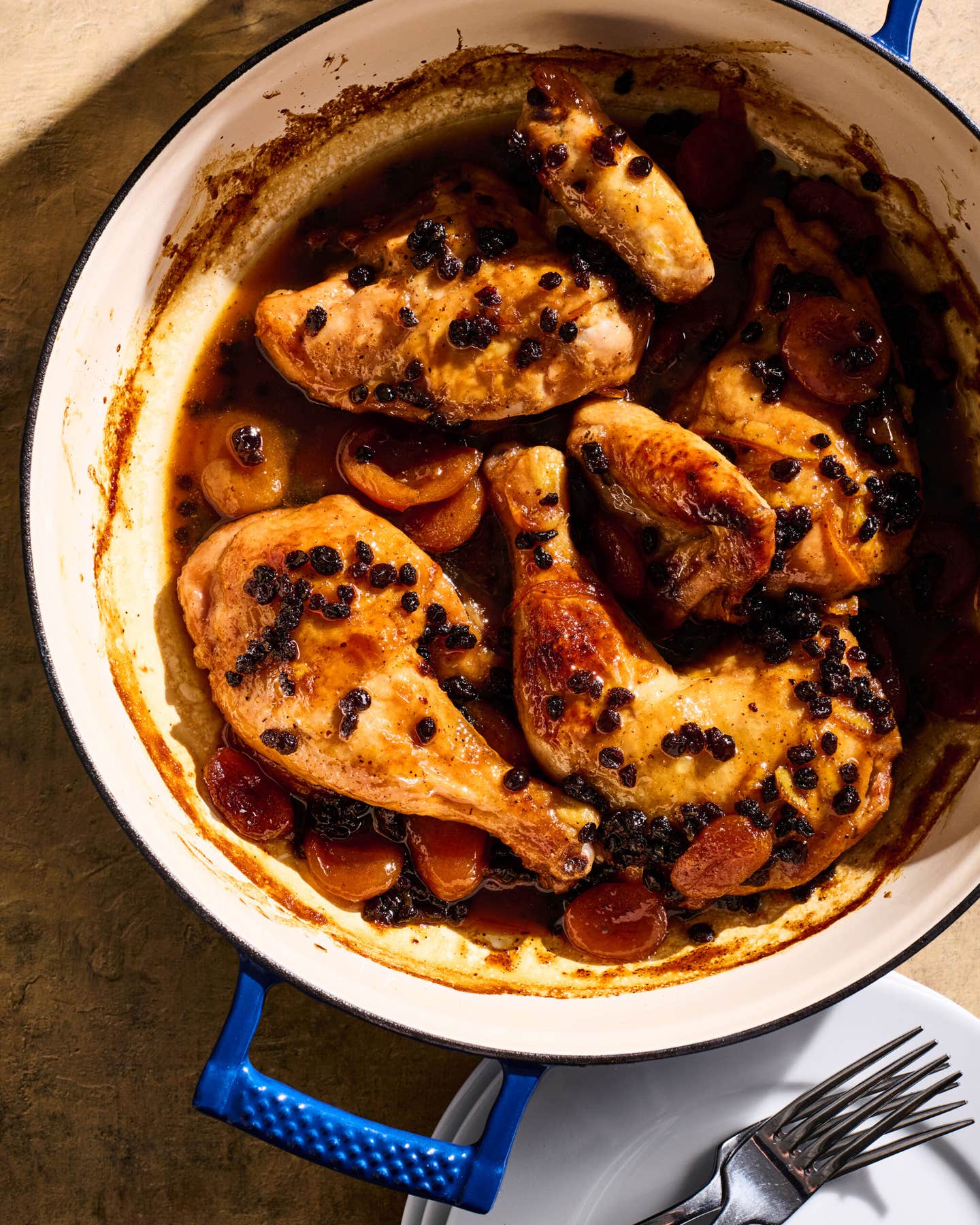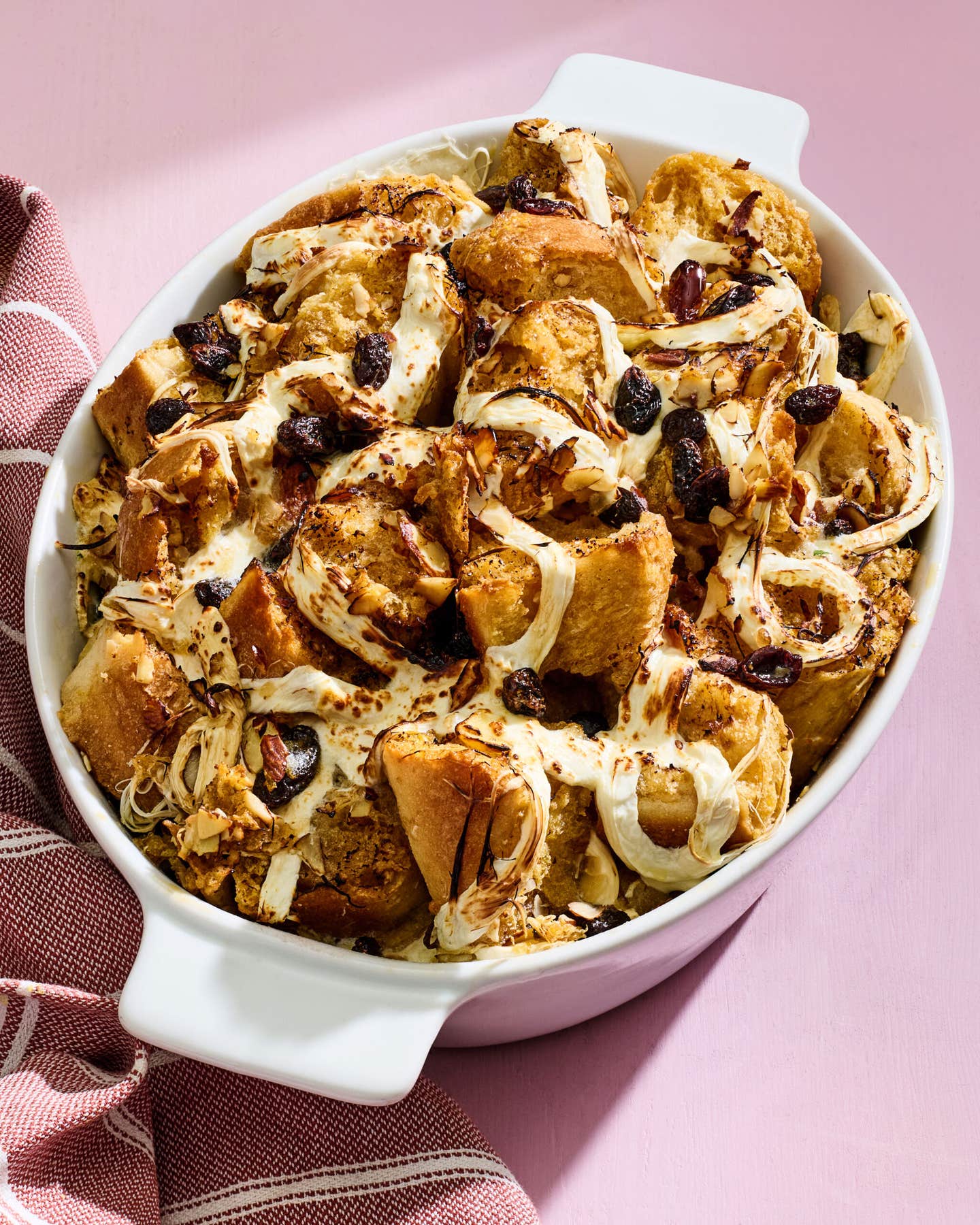
Pepperoni is the most iconic Detroit pizza topping. According to bread guru Peter Reinhart, the key to this pan pizza is “to use pepperoni with a diameter of 1 to 1½ inches, so that it cups up and crisps when baked, its oil trapped in the curled cup.” The richness is balanced out by the bright acidity of pickled peppers. While Detroit-style pizzas are traditionally square, you can also make these pies in two 9-inch cast-iron skillets using the same cook time. If you don't have a stand mixer, you can make the dough in a large bowl, using a large spoon or wet hands.
Adapted with permission from Perfect Pan Pizza by Peter Reinhart, copyright © 2019. Photographs by Johnny Autry. Published by Ten Speed Press, a division of Penguin Random House, Inc.
Featured in “The Best Pizza at Home, With the Gear You Already Have” by Marian Bull.
Ingredients
For the dough:
- 4⅓ cups unbleached bread flour (567 g)
- 1¾ tsp. kosher salt (11 g)
- 1¼ tsp. instant dry yeast (4 g)
- 2 Tbsp. extra-virgin olive oil (28 g), plus more for stretching and folding
For the pizza:
- 3 Tbsp. extra-virgin olive oil, divided
- 1 lb. mozzarella, fontina, or provolone cheese, cut into ¼-inch cubes (3½ cups), divided
- 1 cup Easy Pizza Sauce or store-bought marinara sauce, room temperature
- 4 oz. pepperoni, thinly sliced
- ½ cup pepperoncini or pickled Peppadew peppers, sliced crosswise
Instructions
Step 1
Step 2
Step 3
Step 4
Step 5
Step 6
Step 7
- At least 18 and up to 78 hours before you plan to bake the pizza, make the dough: In the bowl of a stand mixer fitted with the paddle attachment, stir together the flour, salt, and yeast. Add 2 cups cool water (about 60°F) and mix on low speed until a coarse, shaggy dough forms, 30 seconds. Add the oil, increase the speed to medium, and mix until the dough is wet, coarse, and sticky, 30–60 seconds more. (It may seem too wet to form a cohesive dough at this point.) Set aside to rest for 5 minutes.
- Turn the mixer on medium-high and mix until the dough is smooth and sticky (it should be soft and supple to the touch and offer little resistance when pressed with a wet finger), 30–60 seconds.
- Drizzle a clean work surface, a plastic bowl scraper, and your hands liberally with oil. Using the scraper, turn the dough out onto the oiled surface. Flatten the dough with your hands, then lift one end of the dough, stretching gently, and fold it to the center. Lift the opposite end, stretching gently, and flip it over the folded end like a letter. Fold the two wide ends in the same manner, forming a loose rectangle, then flip the dough over so that the smooth side is up. Set aside to rest for 5 minutes. Repeat this stretch-and-fold process three more times, drizzling more oil on your work surface and hands as needed. By the fourth stretch-and-fold, the dough should be much smoother and firm enough to hold together when lifted. Transfer the dough to a lightly oiled large bowl, cover with plastic wrap, and refrigerate for at least 12 hours and up to 3 days.
- Five hours before you plan to bake the pizza, start panning the dough: Drizzle 1½ tablespoons each into two 9-inch square metal cake pans. Divide the dough in half and place one half in each pan. Rub the surface of the dough with oil; using your fingertips, dimple and expand the dough in all directions (it will not reach all the way to the edges at this point). Cover the pans loosely with plastic wrap and set aside to rest at room temperature for 20 minutes. Uncover the pans; starting at the center of the dough, with your fingers angled toward the edges and corners, dimple the dough outward again. Cover and set aside to rest for another 20 minutes. Continue dimpling and resting the dough at 20-minute intervals; by the third or fourth round, the dough should cover the entire surface of the pan. Sprinkle ¾ cup of the cheese cubes over each pan, gently pressing them into the dough. Cover with plastic wrap and set aside to rest until the dough bubbles up around the cheese and rises 2 inches, about 4 hours.
- About 20 minutes before you plan to bake the pizza, set a rack in the center of the oven and preheat to 500°F.
- Immediately before baking, uncover the pans and spread a thin coat of the sauce over the dough. Top with half the pepperoni, followed by the remaining 2 cups cheese cubes (make sure to get plenty around the edges, where the dough meets the pan). Sprinkle the peppers over the cheese, then add the remaining pepperoni. Bake for 8 minutes, then rotate the pans 180 degrees and continue baking until the cheese caramelizes to a deep golden brown, and the pepperoni bubbles and browns, 7–9 minutes more. Remove from the oven.
- Using an offset metal spatula or bench scraper, loosen each pizza from the edges of the pan, then carefully slide it out onto a cutting board. Let rest for at least 1 minute, then cut into 3- or 4-inch squares; serve hot.
Keep Reading
Continue to Next Story










